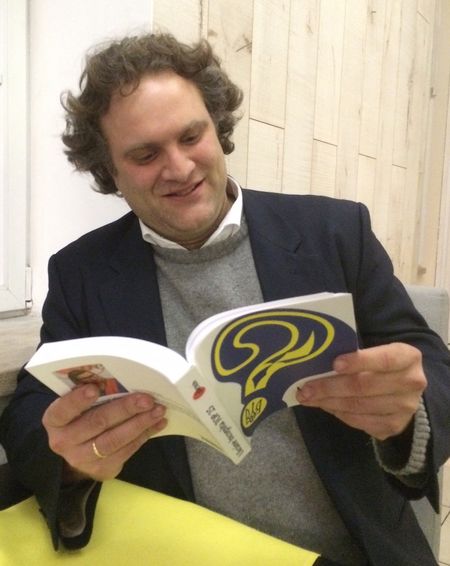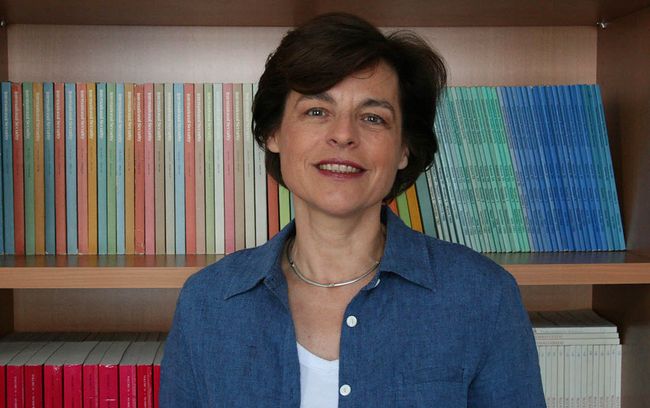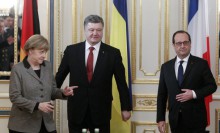Recently, experts from France and Greece visited Ukraine at the invitation of the Institute of World Politics; they told Ukrainian leaders about the perception of Ukraine and peculiarities of doing information work in EU member states. They were senior fellow at the Transatlantic Academy (Washington), professor of the Paris School of International Affairs Marie Mendras and associate professor of history at Freiburg University, lecturer at the International Hellenic University of Thessaloniki Ioannis Karras. The Day talked to these two experts, well versed in the processes taking place in Europe today. Our readers, too, will be interested to learn how events in our country are seen in Greece and France and what Europe, and in particular one of the Normandy format powers, can do to force Vladimir Putin to implement his part of the Minsk Agreements.
Ioannis KARRAS: “We see the events in Ukraine as very similar to what we experienced in 1974”
“Europe is going through many crises, including one, I mean the Greek crisis, which is the largest in the last 30 years of the EU’s existence. I am convinced that Europe will cope with this, because it has a strong will. Many Europeans do not want to see the Greek crisis destroy the EU. I think we will see some action taken eventually that would allow Europe to emerge from the crisis.
“But there is another problem concerning Greece. It is possible that in the coming months, many more refugees will come to Greece than it is sheltering now. And it is not enough to just say that Europe is powerful enough to address this issue, because it must take action now to help the refugees and weakest countries in Europe, which find it hard to deal with the problem.”

Does Europe have leaders able to take the necessary steps?
“I am sure that the leaders of Europe, I mean Francois Hollande and Angela Merkel, do not want to see a geopolitical disaster happen in Greece. But the main problem is that there are a number of countries that do not want to take even a small number of refugees. And, unfortunately, this applies to countries in the Balkans and in Central and Eastern Europe. It is certainly a bad signal. Because, firstly, the EU project itself works only when countries assist each other. For example, if Greece is involved in sanctions against Russia, other countries should help it while it is in trouble. And secondly, the refugees also have rights. There is the International Convention Relating to the Status of Refugees, and it is important that the EU complies with it. Because while it is Syrians who are refugees now, it may tomorrow be Greeks or Ukrainians, or any other nation.”
You have said that Greece supports sanctions against Russia. Is there hope that your Prime Minister Alexis Tsipras will support the continuation of sanctions in summer, when this question will be considered again?
“Of course. This question arose when we did not know what the Tsipras government will do in its first six months. In the end, though, Greece is a member of the EU and NATO. It should also be emphasized that there are many similarities between the Cyprus and Ukraine situations. Most Greeks like Russians and Ukrainians, we see your culture as very close, we all read Ukrainian and Russian literature. At this level, we understand each other, but in the political sense, we see the events in Ukraine as very similar to what we, especially Cypriots, experienced in 1974.”
What, in your opinion, should the EU do to help Ukraine to resolve the conflict in the Donbas?
“First, Cyprus is a good example, as it was divided after the Turkish troops attacked. Yet, despite this, it became a member of the EU. This required 30 years of competent economic policy. But it is a good precedent for Ukraine. The fact that there is an aggressor, in this case Russia, is not enough to prevent a country from joining the EU. In fact, aggression can be a catalyst for reform, because there is always a danger that bad policies will lead to existential threats reemerging (both for Cyprus and Ukraine).
“Secondly, as to Europeans, they can do a lot: to provide technical assistance for various industries, as well as to help directly. Ukrainians should remember that they would benefit a lot from foreign direct investment made possible by successful reforms. But most importantly, Europeans should be open to Ukrainians. They should not get inward-looking and think it is a foreign problem that exists elsewhere. I think that frankness on both sides is most important. After all, if people are open, they can advise, listen to and understand each other. Therefore, the danger for Europe is that it gets inward-looking, and people start to ponder other things altogether.”
Do you think that Europe will yet open to Ukraine, so that it integrates and eventually becomes a member of the European community?
“I am always optimistic, but I think we should not be naive.
“Of course, a lot of work is needed for Ukraine to become a member of the EU. This means that you need a lot of patience. I am a historian and I think that such things are possible, but it will require 30 years of work, not 5. For this to happen, we need to understand why this is important. This is important not because Europe is a good slogan or because Europe means modernization, but because the European project means the ability of nations to exist together and jointly solve problems. For example, there is mutual understanding between Germany and France, even though they were eternal enemies. This understanding is supported and operates always via negotiations and never via violent solutions to issues.”
But do you see what Russia is doing now in Ukraine? It first annexed Crimea and is now continuing an aggressive war in the Donbas. And this is after Putin repeatedly called Ukrainians and Russians “one people.”
“It is true. I know that no dialog can be had now between Ukraine and Russia because Russia is not ready for it. But I mean that every country in Europe should be open to the process of negotiations going on with other countries. Greece and Turkey are a good example of this. The problem is intractable, but we must try, because we want to see Cyprus reunited. Another very important factor: Europe unites democratic states with the rule of law. Legislation establishing democracy and the rule of law is designed to guarantee the basic equality of all European citizens.”
We have our own history which Russia steals, and it is even saying that its origins lie in Kyivan Rus’ and the reign of Yaroslav the Wise. We have to protect our history. What do you think of this as a historian?
“I would approach it differently. There is a major debate regarding Alexander of Macedon’s identity: was he a Greek or a Macedonian? Ultimately it does not matter. He belongs to those who use his image, which had its positives and negatives. This is because history and culture cannot be closed. And then, the most important thing is that Kyivan Rus’ was a great civilization. It is enough to enter the beautiful church of St. Sophia to realize that this civilization can influence all of us, talk with us, and change us even today, whoever we are and wherever we come from. Of course, this was Ukrainian civilization, but it can be seen as Russian civilization as well, and I would say that it was partly Greek civilization, because it had strong links with Byzantium, which is a phenomenon of Greek culture to some extent too. Byzantium gave a lot to Bulgarians and Turks, Armenians and Syrians, and Italians, and, of course, Russians and Ukrainians (and these are only a few peoples among those who can claim the Byzantine heritage). The existence of a single position is less important than the impact we can have on each other. For this is, after all, a gift.”
Why does Greece oppose the name of Macedonia for the former Yugoslav republic, thereby blocking the country’s membership in NATO?
“The official reason is that the largest region of Greece is also called Macedonia, and the Greeks are very concerned that if the country now called the FYROM starts to call itself Macedonia, this will make it want to annex Greek Macedonia as well and occupy the land from the Aegean Sea to the southern mountain regions of Bulgaria. No one wants to revive the nationalities issue in the Balkans now.
“If we look at the map of the 19th century Ottoman Empire, we see that the province of Macedonia included areas that belong to various Balkan countries now. And all these areas had mixed populations, both in language and with regard to religion. This is how the name ‘Macedonian salad’ originated, which is used for a fruit salad. Historians research it.
“This problem could have been solved long ago. For example, they could have named their part of the historic province ‘Northern Macedonia’ or ‘Vardar Macedonia.’ All are entitled to use the name ‘Macedonia’ as long as they agree that all Macedonians are one.”
Marie MENDRAS: “We will keep supporting Ukraine and the peace process and will keep pressure on Russia”
“Many people in Europe, not only in France, have begun to realize that the Russian government has become a danger, for President Putin decided to combat the peaceful Euromaidan protests by force, and the internal situation in Ukraine turned into a great crisis of security in Europe. Our people are even now at loss why the Russian government has made such a big mistake. Since its annexation of Crimea, and worse still, the start of the conflict in the Donbas, a majority of Europeans, not just French, have understood that the Russian president is seeking confrontation, seeking risky developments. And now, not only our national security, but also the security of Europe depends on the decisions taken by the Kremlin. After all, before the Euromaidan, Putin had good enough relations with almost all governments in Europe, despite the negative trends in Russia. He has ruined this relationship and opted for a course of opposition and even confrontation with us.

“Ukraine reacted in a very dignified manner to Russia’s aggression and tried to respond to the Kremlin’s provocations as peacefully as possible, avoiding escalation and war. Therefore, Ukraine now enjoys a good reputation in the capitals of Europe and all NATO countries, for the war with Russia has not come, and probably will never come. For Europe, peace is all-important. We understand that without peace process, everything is possible, including a danger of war.
“In recent months, Putin also opted for escalation in Syria. We in Europe see the refugee crisis as a major issue, and Russia has exacerbated it even more. The Russian Air Force bombed Syria, causing even more refugees to flee that country.
“Moreover, it is unclear what Putin wants. Does he want a confrontation? However, we in Europe do not want to fight, do not want a confrontation, and we will keep supporting Ukraine and the peace process and will keep pressure on Russia so that it realizes that only through a peace process it can recover its standing on the continent.”
This newspaper compared Putin’s statement on the withdrawal of Russia’s main forces from Syria with an anecdote about a Jew, a rabbi, and a goat, titling an article “Will the West Succumb to the Goat Trick?” In other words, Putin, like the anecdotal rabbi, first forced Europe to buy a “goat” by sending his troops into Syria, and then seemingly advised to sell the beast by deciding to withdraw the main forces from that country.
“Quite simply, Putin made a mistake. And he will make more. We know and understand it.”
What to do to have him changing his calculation, or in other words, changing his anti-Ukrainian policies (as you know, Barack Obama expected precisely that when introducing sanctions against Russia)?
“We must be very careful and persistent in relations with Russia. We understand that, unfortunately, while Putin is in power, nothing good is likely to come from it. On the other hand, we expect a lot from Ukraine. And here I see some tension and uncertainty. We are not too clear about the strategy espoused by the Ukrainian Cabinet and president. All of Europe is watching the political crisis and expecting the president and prime minister to take action. We do not know how this conflict between two leaders will end, and how much the cause of reform is advancing. It seems that reforms are being slow in implementation.
“On the one hand, it is good that Ukraine takes on great responsibility, but it should realize that Europe and the US expect explanations and political transparency of Ukraine. We lack information.”
What exactly do you lack? Do not we have the European integration strategy and accordingly, the Association Agreement with the EU?
“But it does not mean anything in particular. There are no specifics behind it, we do not understand how reforms are being done.”
And what role do you think France can play in making Ukraine stronger economically and militarily, so as to be able to counter the Russian aggression?
“It has been two years since the beginning of the Russian aggression. Ukraine needs political will, strategy, smart and brave people who can define strategies and move forward.
“France and Germany have played a major role in achieving the Minsk Agreements, which have proved to be helpful, because even though there is still some tension in the Donbas, there is no war as such. People do not die in large numbers now, as they did before. And this is very important. We want peace and exert pressure on the Kremlin to get it to stop supporting the rebels there. The sanctions imposed by Europe, the US, Canada, Australia showed the Kremlin that we have the political will and that Western solidarity will persist this year as well.
“However, we expect more specific explanations and demonstration of political, economic, and social reforms from Ukraine. I believe that the reform process continues in Ukraine. I am in Kyiv now and see that it is slow. You have a problem with communicating. You just do not have an efficient PR service! (Laughs.) Our public in Europe does not understand Ukrainian politics full well, and besides, we have other pressing problems: refugees, terrorism, economic turmoil. Ukraine is not the most pressing of them. Therefore, Ukrainians should demonstrate on a daily basis that the reform process is going on, and is quite fast as well. The Ukrainian government should explain to us and its own public what is its policy on the population of the Donbas, displaced persons, and citizens who live under occupation.”








